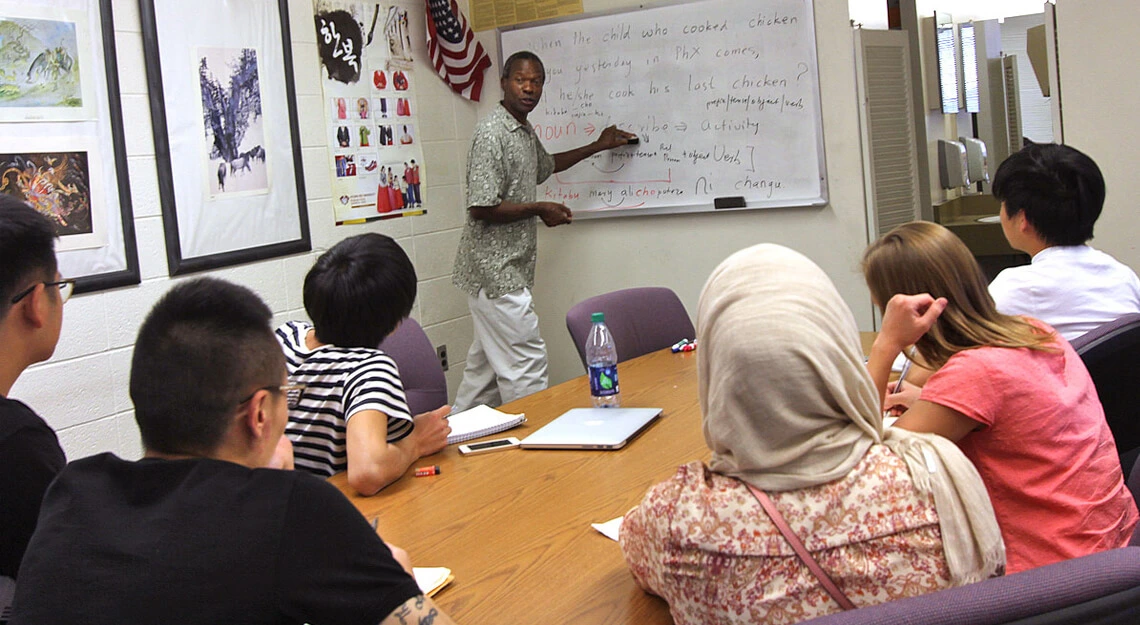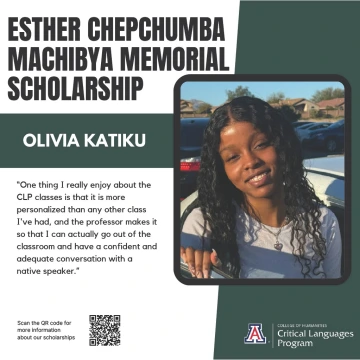Swahili is taught by the Critical Languages Program at the University of Arizona with credit and non-credit options available. 🎓 Small class sizes, expert tutors, and immersive learning that connects language with lived experience.

Why Study Swahili?
Swahili, or Kiswahili, is one of Africa’s most widely spoken languages, serving as a key cultural and communication bridge across East and Central Africa. With over 150 million speakers, it is a national or official language in countries like Kenya, Tanzania, Uganda, and the Democratic Republic of the Congo, and a working language of the African Union.
✔️ Widely used across Tanzania, Kenya, Uganda & DRC
✔️ One of the official languages of the East African Community
✔️ Rooted in centuries of trade, poetry, and community
✔️ CLP Scholarships Available for the study of Swahili
✔️ Complete the UA Language Requirement!
What you will be able to do: Swahili Student Learning Outcomes for 101 and 102 Courses
Meet the B.S. Language Requirement:
After two semesters of study, you should comprehend spoken Swahili at a moderate pace on familiar topics, such as greetings, family, weather, and daily life. You should be able to introduce yourself, talk about personal interests, and engage in everyday interactions. You will be able to understand simple texts like menus and schedules and write short paragraphs on familiar topics. Culturally, you will begin to understand customs, greetings, festivals, the Kiswahili calendar, and basic cultural norms in communication.
Meet the B.A. Language Requirement:
After four semesters of study, you should be able to understand and participate in conversations on a wide range of familiar topics, including travel, studies, and current events, with growing fluency and accuracy. You will comprehend spoken and written Swahili in various formats and be able to write coherent essays. You'll increase your cultural awareness by discussing social norms, media, regional variations, and historical influences.

What Can You Do with Swahili?
- Work in international development or diplomacy: Swahili is a critical language for the Peace Corps, USAID, and global NGOs working in East Africa.
- Travel with ease across East Africa: As a lingua franca in countries like Tanzania, Kenya, Uganda, and the DRC, Swahili helps you connect with communities, navigate cities, and explore local cultures.
- Pursue careers in tourism, trade, or humanitarian work: Swahili is vital for regional business, eco-tourism, healthcare outreach, and education programs.
- Engage with African literature, film, and music: Access East African poetry, Swahili hip hop, traditional proverbs, and oral storytelling traditions.
Learn faster with a student-friendly structure: Swahili has simple pronunciation, no verb conjugation by subject, and no gendered nouns—making it one of the most approachable African languages for English speakers.
Swahili is more than just a language—it’s a gateway to East African cultures, relationships, and opportunities. Whether you're interested in global careers, study abroad, or community-based projects, Swahili can expand your world and deepen your cultural understanding.
Ready to begin? Our courses are welcoming and practical, with credit and non-credit options available. No prior experience needed.
Course Section Number: 391
Credit and Non-Credit Options
Helpful Links
Origins of the Swahili Language
Swahili, also known as Kiswahili, Kiswahili is an African language that currently serves multiple functions across regional, continental, and international levels. With its origins in East African coastal societies, Kiswahili is now an official and national language in most East African countries, including Tanzania, Kenya, and Uganda. It is a lingua franca in East, Central, and a few parts of Southern Africa, making it critical in multi-ethnic societies in these geographical spaces. Given its influence in promoting diplomatic ties in the continent, Kiswahili serves as an official and/or working language in different continental organizations, including the East African Community (EAC) with its headquarters in Arusha, Tanzania; the African Union (AU), whose headquarters are located in Addis Ababa, Ethiopia; and the Southern African Development Community (SADC) with its headquarters in Gaborone, Botswana.
Still, from a global perspective, Kiswahili has been adopted in various educational systems due to its influence on the diaspora, tourism, diplomacy, and cultural exchanges. As such, Kiswahili courses are offered in several institutions across the globe, mainly as a second, foreign, or additional language, in Asia, Europe, and the US, which has the highest number of such institutions globally. From a cultural perspective, the presence of Kiswahili literary works, including literature, music (such as Taarab and Bongo Fleva), and its rapidly growing film industry from East African countries continues to position this language in the global scene. Based on the above and its critical contribution, mainly for fostering unity and societal cohesion, in 2021, UNESCO granted Kiswahili international status. Thus, every July 7th, Kiswahili International Day is celebrated globally.
CLP Tutors

Msafiri Otonya
Teles creates an open and fun learning environment during the tutorial sessions. Teles makes mistakes learning moments, and I am never afraid to make a mistake because I know I will learn from it."
CLP Student | Swahili 101

